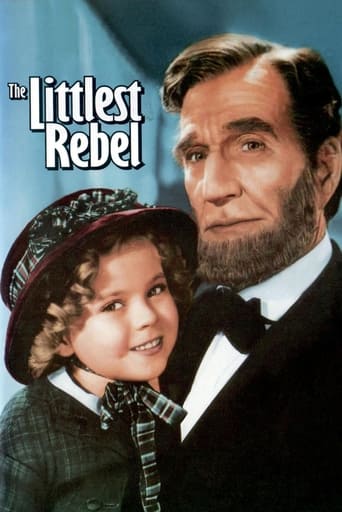SnoopyStyle
Virgie Cary (Shirley Temple) is a precocious child on a plantation estate. Uncle Billy is her dutiful slave servant and James Henry is the slack-jawed slow-witted one. The war breaks out during her 6th birthday party. Her daddy joins the rebel army. The plantation falls behind Yankee lines. Captain Cary sneaks home to visit as a scout. Marauding Yankees are searching for him and Virgie puts on black face to hide. The kind Colonel Morrison stops the troops' pillaging.This is a different era in Hollywood. It's the vision of antebellum south where slavery is gentle and harmless. Slaves are dutiful and submissive. One can't judge it in modern terms but one can't ignore the historical slant either. It's also a movie that is trying to appeal to a family audience. It does have the innocence of a child who doesn't see the point of the war. Its heart is in the right place for its time but times have moved on.
wes-connors
At her Richmond birthday party, six-year-old Shirley Temple (as Virginia "Virgie" Cary) is delighted when dutiful dancing slave Bill "Bojangles" Robinson (as "Uncle Billy") entertains on cue. The towering tap-dancer doesn't understand slavery. And yet, Mr. Robinson is one of the smarter servants in the cast. The others, led by Willie Best (as James Henry), can most politely be described as mentally challenged. The outbreak of the US Civil War disrupts Ms. Temple's happy life. Handsome father John Boles (as Herbert Cary) is called to duty, and "The Littlest Rebel" must see President Lincoln himself, to set things right...Unless some subversive statement is being made by having the confederate "Curly Top" leading a group of Black children in white-coned caps, the motive is strictly to entertain. However, the story features abhorrently rampant racism. Here, the slaves are happy to serve the obviously superior white folks - and why shouldn't they? They wouldn't know how to say, "Emancipation Proclamation," let alone understand slavery. Other racially problematic films have some depth to the characters, attempt to honestly reflect the times, or advance film as an art. You have little of that, here. Temple and Robinson dance appealingly together, however.*** The Littlest Rebel (12/19/35) David Butler ~ Shirley Temple, Bill Robinson, John Boles, Willie Best
richard-1787
The previous review of this movie begins with the question "Can you get past the racism of the era?", and concludes that you can't. I won't argue that you should "get past" the racism. Rather, I'd argue that you need to look right at it and see that it is not simple, and not just a matter of stereotypes.Yes, Willie Best's character is an embarrassment when it is not infuriating. There's no arguing that.But Bill Robinson's character is very different. He is the one on whom Mrs. Cary relies when her husband is at war, he is the one who makes it possible for Cary to get back to see his wife as she is dying, etc. He is also the one who makes it possible for he and little Virgie to get to Washington and, eventually, plead her father's case with President Lincoln. In short, he is the character who makes pretty much everything good happen. Yes, there is injustice in that he should have received higher billing as a result, and he should have been in the final shot with Temple, as he was as important as her father and more important than Jack Holt. That was unfair, and though probably based on what Fox thought American audiences of the time would tolerate, nonetheless a concession to the racism of the time. But for its time, this movie is remarkably devoid of the "dumb and happy darkie" stereotypes of the time that are so infuriating.Furthermore, little Virgie never once treats "Uncle Bill" as anything less than an equal. Nor do her parents ever treat him disparagingly.Race relations in this movie are not perfect. But neither are they stereotypes. There is no point on zooming in on Willie Best's character and going through all the modern clichés of moral superiority, only to dismiss it. The movie deserves better than that.Yes, the dancing by Robinson and Temple is a wonder. But this movie has other things that are worth examination as well.Forget what you may have been told about this movie and try to watch it with an open mind. You won't waste your time.
abrafocus
I am not a super-duper humongous fan of Shiley Temple, but boy, was she a good child actress. My favorite S.T. movie is "Heidi.", but I think this one is a close second.It takes place during the Civil War. Shiley Temple plays Viginia Cary, a young girl who lives in the south with her parents. Her father is called to the Confederate Army, and tries to sneak back to visit his family. He's arrested, and a Yankee arranges an escape. But it doesn't work, and they are both arrested and sentenced to death. But Virginia and Uncle Billy, a friend of Virginia's, goes to visit President Lincoln and begs him to intervene.This is a classic movie about war, and one that actually has a good ending.My score: 7/10.


